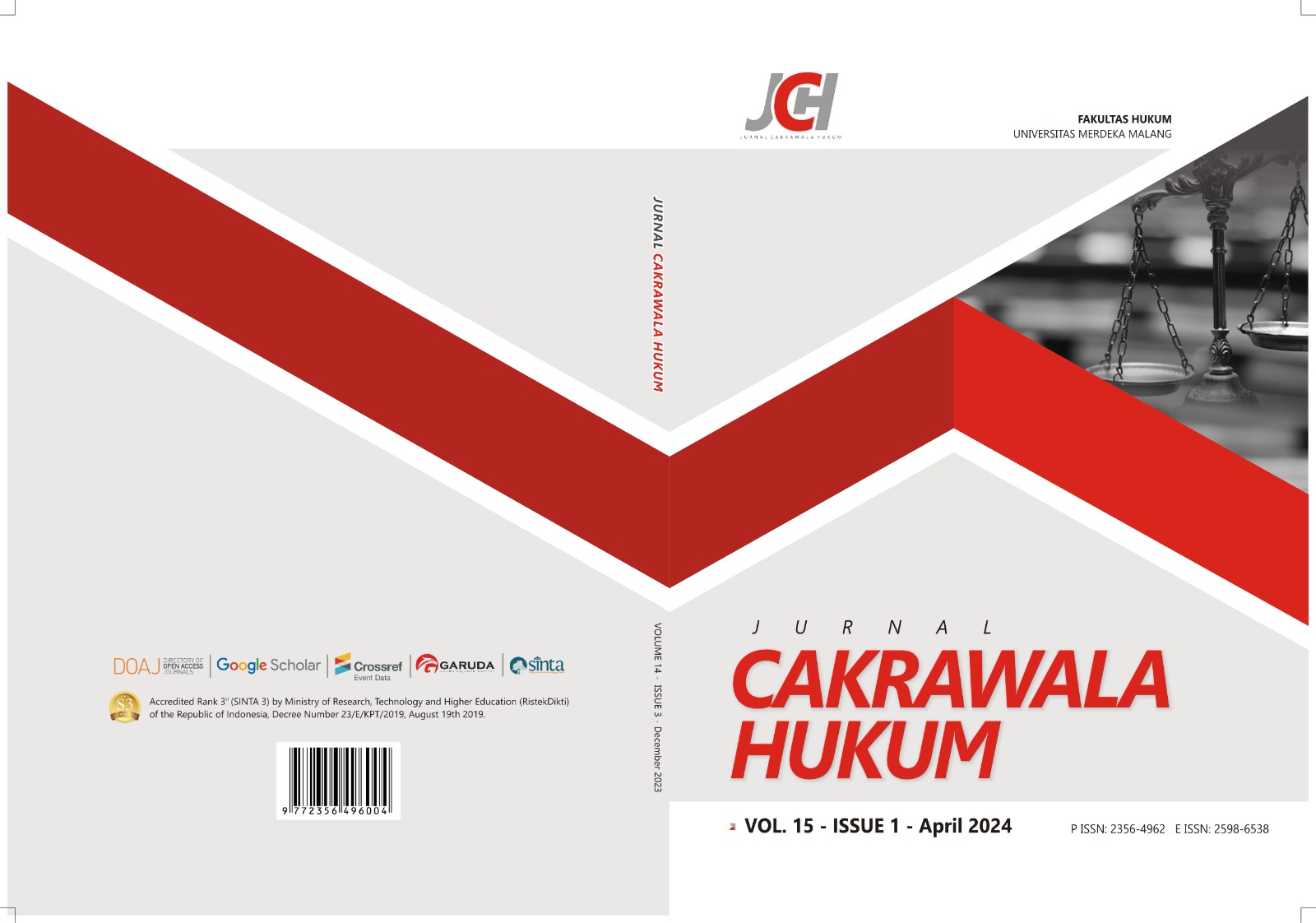The Strengthening of Tax Court Independence in the Indonesian Judicial System
DOI:
https://doi.org/10.26905/idjch.v15i1.14276Keywords:
Tax Court, Constitutional Court, Decision No. 26/PUUXXI/ 2023Abstract
This study aims to analyze the strengthening of the Tax Court's independence within Indonesia's judicial system following the Constitutional Court Decision No. 26/PUU-XXI/2023. The ruling alters the administrative structure of the Tax Court from a dual system to a unified system under the Supreme Court, transferring oversight authority that was previously under the Ministry of Finance. This research employs a normative juridical method with a statutory, conceptual, and case-based approach. The findings indicate that the implementation of this unified system is a significant step toward enhancing the independence and impartiality of the Tax Court, which was previously vulnerable to executive interference. Furthermore, this change aligns with the principle of the separation of powers as advocated by Montesquieu, emphasizing the necessity of separating judicial power from executive and legislative branches. The Constitutional Court Decision No. 26/PUU-XXI/2023 is expected to strengthen the role of the Tax Court as an independent judicial body, free from government influence, and tasked with upholding justice for taxpayers in Indonesia. This study provides a crucial contribution to understanding the constitutional implications of this decision for the judicial system in Indonesia.
How to cite item: Regika, V., Sari, M., Muhkam, M., & Amir, I. “The Strengthening of Tax Court Independence in the Indonesian Judicial System.” Jurnal Cakrawala Hukum, 15(1). (2024):80-90. DOI: https://doi.org/10.26905/idjch.v15i1.14276.
References
Asshiddiqie, Jimly. Pengantar Ilmu Hukum Tata Negara (Jakarta: Sekretariat Jenderal dan Kepaniteraan Mahkamah Konstitusi RI, 2006), 45, akses URL: www.mahkamahkonstitusi.go.id.
Bravestha, Rio & Hadi, Syofyan. KEDUDUKAN PENGADILAN PAJAK DALAM SISTEM PERADILAN DI INDONESIA. Mimbar Keadilan. 1. (2017). DOI: https://doi.org/10.30996/mk.v0i0.2197.
Devitasari, Ananthia Ayu. “Menakar Independensi Hakim Pengadilan Pajak Pasca Putusan MK Nomor 10/PUU-XVIII/2020,” Jurnal Konstitusi 17, no. 4 (2021): 879–98, DOI: https://doi.org/10.31078/jk1748.
DM, Mohd. Yusuf, Atma Kusuma, Elvina Elisabeth Uli, Fhlorida Agustina Simanjuntak, Darwin Darwin, and Geofani Milthree Saragih. 2023. “Eksistensi Peradilan Pajak Dalam Kekuasaan Kehakiman Di Indonesia”. Jurnal Pendidikan Dan Konseling (JPDK) 5 (1):1280-85. DOI: https://doi.org/10.31004/jpdk.v5i1.11152.
Fajri, A., & Amir, I. Penegakan Hak Konstitusional Melalui Constitutional Question Serta Relevansinya Terhadap Negara Hukum Pancasila. Constitutional Law Review, 1(1), (2022): 39-56. DOI: https://doi.org/10.30863/clr.v1i1.3372.
Gotama, I Wayan Sentana, Ida Ayu Putu Widiati, & I Putu Gede Seputra, “Eksistensi Pengadilan Pajak Dalam Penyelesaian Sengketa Pajak,” Jurnal Analogi Hukum 2, no. 3 (2020): 331–35, DOI: https://doi.org/10.22225/ah.2.3.2521.331-335; Fitri Suciyani, “Kedudukan Pengadilan Pajak Dalam Sistem Peradilan Di Indonesia,” “Dharmasisya” Jurnal Program Magister Hukum FHUI 2, no. 1 (2022): 375–88. DOI: https://doi.org/10.30996/mk.v16i2.8909.
Hamzah, Moh. Amir. Hukum Acara Perdata Peradilan Tingkat Banding, (Malang: Setara Press, 2013).
Handini, Rizkityas Sekar. Budi Ispriyarso, & Nabitatus Sa’adah, “Kewenangan Menteri Keuangan Dalam Pemilihan Ketua Dan Wakil Ketua Pengadilan Pajak Setelah Dikeluarkannya Putusan Mahkamah Konstitusi Nomor 10/PUU-XVIII/2020,” Administrative Law and Governance Journal 5, no. 1 (2022): 90–102, DOI: https://ejournal2.undip.ac.id/index.php/alj/article/view/14557.
Rumadan, Ismail. “Kedudukan Pengadilan Pajak Dalam Sistem peradilan di Indonesia,” Neliti.com, 2011, akses URL: https://media.neliti.com/media/publications/278193-kedudukan-pengadilan-pajak-dalam-sistem-f1c433e2.pdf. 44–45.
Ispriyarso, Budi. “Penyatuan Pembinaan Pengadilan Pajak,” Administrative Law and Governance Journal 2, no. 4 (2019): 650–60, DOI: https://doi.org/10.14710/alj.v2i4.650-660.
Ispriyarso, Budi. Athasius P. Bayuseno, dan Harlida Abdul Wahab, “Legal Reformation of Tax Court in Indonesia: Reforming Legal Culture, Institutional and Legislative Aspects,” International Journal of Criminology and Sociology 10 (2021): 722–28, DOI: https://doi.org/10.6000/1929-4409.2021.10.86.
Maulana, Esty. et al., “Legal Implications of the Constitutional Court Decision No. 18/PUUXI/2013 on Simplifying Birth Certificate Registration Procedures in Indonesia,” Constitutional Law Review 3, no. 1 (30 Mei 2024): 19–37, DOI: https://doi.org/10.30863/clr.v3i1.5602.
Nasution, Bahder Johan. Negara Hukum Dan Hak Asasi Manusia (Bandung: Mandar Maju, 2012).
Putusan Mahkamah Konstitusi Nomor 26/PUU-XXI/2023.
Republik Indonesia, “Undang-Undang No 14 Tahun 2002 Tentang Pengadilan Pajak” (2002).
Republik Indonesia, “Undang-Undang Republik Indonesia Nomor 4 Tahun 2004 Tentang Kekuasaan Kehakiman” (2004).
Republik Indonesia, “Undang-Undang Republik Indonesia Nomor 48 Tahun 2009 Tentang Kekuasaan Kehakiman” (2009).
Republik Indonesia, Rancangan Undang-Undang Nomor 14 Tahun 2002 tentang Pengadilan Pajak.
Republik Indonesia, Undang-Undang No 14 Tahun 2002 Tentang Pengadilan Pajak.
Republik Indonesia, Undang-Undang Nomor 7 Tahun 2020 tentang Mahkamah Konstitusi.
Simolang, Kristendo. “Kedudukan Pengadilan Pajak Dalam Sistem Peradilan di Indonesia,” Lex Administratum 6, no. 4 (2019): 5–11. Akses URL: https://ejournal.unsrat.ac.id/v3/index.php/administratum/article/view/27565.
Situmeang, Tomson. “Reposisi Pengadilan Pajak Menurut Sistem Kekuasaan Kehakiman Di Indonesia,” Honeste Vivere 32, no. 2 (27 Juni 2022): 108–22, DOI: https://doi.org/10.55809/hv.v32i2.138.
Sonata, Depri Liber. “METODE PENELITIAN HUKUM NORMATIF DAN EMPIRIS: KARAKTERISTIK KHAS DARI METODE MENELITI HUKUM”. Fiat Justisia: Jurnal Ilmu Hukum 8 (1). 2015. DOI: https://doi.org/10.25041/fiatjustisia.v8no1.283.
Susanto, Nur Agus. “Independensi Kekuasaan Kehakiman dan Efektivitas Sanksi untuk Kasus Hakim Penerima suap,” JURNAL YUDISIAL 4, no. 01 (2011): 28–45, DOI: https://doi.org/https://doi.org/10.29123/jy.v4i1.201.
Taufiqurrahman, Fadhlan. “Pembinaan Organisasi , Administrasi, dan Keuangan Pengadilan Pajak Pasca Terbitnya Putusan Mk Nomor: 26/Puu-Xxi/2023 Terhadap Kekuasaan Kehakiman yang Merdeka,” UNES Law Review 6, no. 2 (2023): 6058–64, DOI: https://www.review-unes.com/index.php/law/article/view/1443.
Tim Penyusun Hukum Acara Mahkamah Konstitusi, Hukum Acara Mahkamah Konstitusi Republik Indonesia (Sekretariat Jenderal dan Kepaniteraan Mahkamah Konstitusi, 2010).
Tohadi, Tohadi. & Dian Eka Prastiwi, “Rekonstruksi Hukum Dalam Mewujudkan Kepatuhan Pembentuk Undang-Undang Terhadap Putusan Mahkamah Konstitusi Sebagai Mekanisme Checks And Balances,” Jurnal Rechts Vinding: Media Pembinaan Hukum Nasional 11, no. 1 (2022): 19, DOI: https://doi.org/10.33331/rechtsvinding.v11i1.849.
Tutik, Titik Triwulan. Konstruksi Hukum tata Negra Indonesia Pasca-Amandemen UUD 1945, (Jakarta: Kencana, 2015).
Downloads
Published
How to Cite
Issue
Section
License
Copyright (c) 2024 Jurnal Cakrawala Hukum

This work is licensed under a Creative Commons Attribution-ShareAlike 4.0 International License.
Authors who publish in this journal agree to the following terms:
The copyright of the received article shall be assigned to the journal as the publisher of the journal. The intended copyright includes the right to publish the article in various forms (including reprints). The journal maintains the publishing rights to the published articles. Authors must agree to the copyright transfer agreement by checking the Copyright Notice column at the initial stage when submitting the article.





